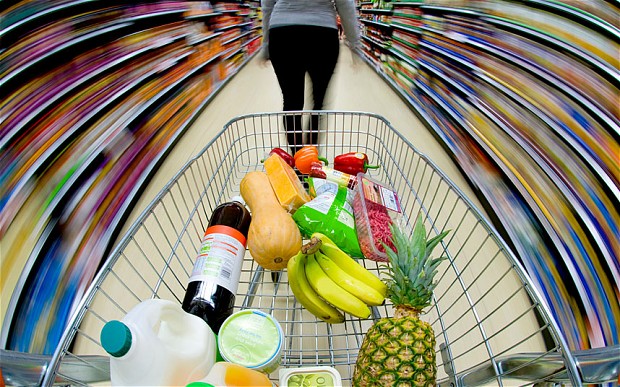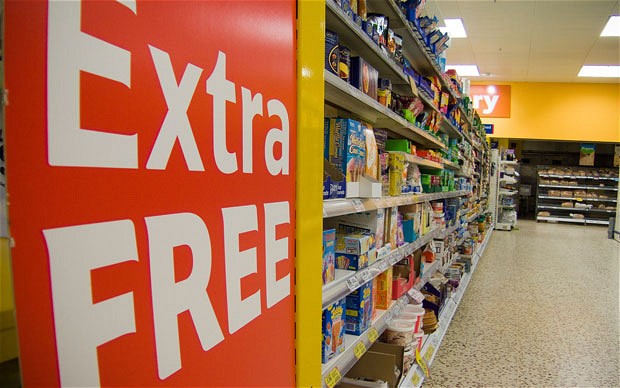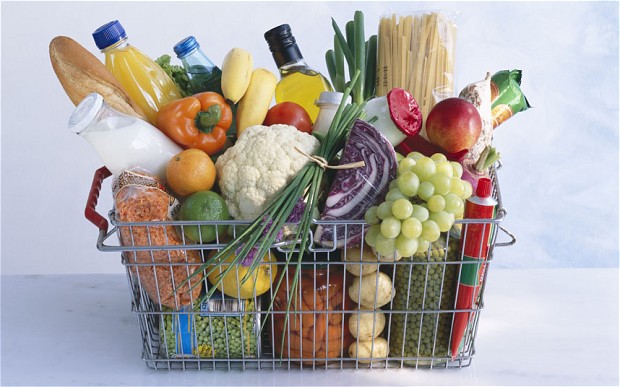Katie Morley
11 Feb 2016
Telegraph UK
Supermarkets face ban on ‘special offers’ that cost shoppers £1,000 a year

Major stores including Waitrose, Tesco, Sainsburys and Asda are under official investigation over “rip off” deals
Photo: ALAMY
Misleading buy-one-get-one free offers and special deals in supermarkets could be banned within weeks under a clampdown being prepared by watchdogs, as research reveals such deals are “seducing” shoppers into spending an extra £1,000 a year.
The Telegraph understands the Competition and Markets Authority, the consumer regulator, is finalising plans to take action against Britain’s biggest supermarkets, which stand accused of using unlawful pricing and promotional practices, designed to encourage customers to spend more.
Major stores including Waitrose, Tesco, Sainsburys and Asda are under official investigation after consumer group Which? invoked a rarely-used legal power to launch a “super-complaint” and demand action against supermarkets.
Bigger packets or 50pc extra are not always good value for money if we end up chucking most of it away
John Penberthy-Smith, customer director at the Money Advice Service
Among the questionable deals Which? condemned were multi-buy offers that didn’t reflect a real saving, reductions based on an ungenuine previous price, and seasonal offers where the higher price only applied out of season.
The action could come in the form of tighter pricing rules and in some cases supermarket giants found to have been running unlawful deals could be prosecuted and forced to shell out huge fines.

Extra free, price discount notice in a supermarket
Tesco, Asda, Morrisons, Sainsbury’s and Ocado were all found to be offering misleading deals Photo: ALAMY
It comes as the Money Advice Service, a Government backed body, has revealed that on average shoppers are spending an extra £11.14 (21pc) a week more than they planned as a result of being tempted by “deals”, with three-quarters (76pc) admitting to regularly over-spending on their weekly grocery shop.
• 15 supermarket rip-offs that led to an inquiry
The organisation has also developed a new test which suggests that an overwhelming majority of shoppers are unable to spot the difference between supermarkets ripping them off with a fake deals, and a genuine “bulk-buy” discount.
Just 50 (2pc) out of the test’s 2,000 respondents were able to select the best-value option from four sets of multi-buy offers, while around a quarter (26pc) failed to answer a single question on the test correctly.
Industry experts said shoppers in supermarket environments are largely unable to seperate good value from poor, because they typically buy a large number of items in a short space of time, often making decisions at rapid speed.
According to an academic journal published by the Society for Judgement and Decision Making, shoppers select items from grocery store shelves at an average speed of 0.4 seconds.
The Money Advice Service is urging people to make shopping lists before the enter supermarkets, claiming shoppers who do this are three times less likely to be temped by deals and overspend on their grocery billl.

Every year 7.2 million tonnes of food is wasted in UK homes, costing £2.5 billion Photo: Getty Images
Mark McArthur-Christie, director at Rubuss, a corporate communications consultancy, said: “Supermarkets make comparing prices very difficult, even when they know shoppers are led on very quick choices. The reality is they don’t have time to think, which is why they are so often swayed by big red bargain tickets.”
John Penberthy-Smith, customer director at the Money Advice Service, said: “The problem is that quite often we see a special offer at the supermarket and we don’t want to miss out – so we throw it into our trolley without really thinking about whether it is a good deal or whether we actually need it.
“Often deals can be difficult to understand and compare with other prices. Then there’s waste – even if the offers are cheaper, bigger packets or 50pc extra are not always good value for money if we end up chucking most of it away.”
• Supermarkets face inquiry into ‘rip-offs’
A Competition and Markets Authority spokesman said: “Following the CMA’s response to the Which? super-complain published on July 16, 2015, we have been undertaking further analysis of the potentially misleading practices identified in our report and establishing our priorities for further action.”
A spokesman for the British Retail Consortium, which represents supermarkets, said: “UK retailers are committed to treating their customers fairly and to avoid misleading them in any way.
“Millions of shoppers across the country enjoy the benefits of price promotions and special offers. Recent research has shown that, with the exception of fruit and vegetables, food prices in British supermarkets are on average 7pc lower than the eurozone average. In addition, major supermarkets have worked with Government and public bodies to make pricing clearer and simpler for customers, such as improving the way that unit price is displayed”.
This quiz has been devised by the Money Advice Service and is designed to be completed quickly, at a glance, like in a supermarket. When done this way, only two per cent of people get the answers right:
Subscribe to our free mailing list and always be the first to receive the latest news and updates.
